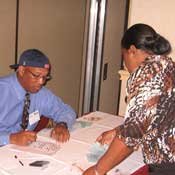Wednesday, August 17, 2011
It's almost the end of the month, and a family is trying to decide how to stretch their money to buy groceries. One family member doles out a few bills, explaining that they have to spend it a little bit at a time, otherwise they won't have any food at the end of the week.
Nearby, the Chen family is trying to decide which bills they can afford to pay. The utility company tells them their phones and electricity are about to be shut off. They try negotiating.
"Can I get an extension?" Charles Chen asks. "I can only give you $50. My mortgage is due; my wife is the only person working. I can pay $50."
The utility company agrees to keep the electricity on, but the family loses their phone service.
These "families" were part of a poverty simulation held Monday, Aug. 15, in Jackson. Organizers assigned scenarios and roles to participants, including the person playing the role of Charles Chen, based on the situations of real-life families. Those taking part spent an hour and a half experiencing some of the frustrations that people living on a low income or in poverty routinely face, such as not being able to find work or running out of food and not knowing which agency to go to for help.
Stations representing grocery stores, pawn shops, relief agencies and prisons lined the edges of the room where the simulation took place, while a "criminal influence" tried to convince people who had lost their jobs to sell drugs for him.
Linda Barnes is the manager of low-income systems for Entergy, which helped organize the event.
"This afternoon, you'll go home," she told participants after the poverty simulation was over. "You'll have plenty to eat; you probably won't have to worry about paying your rent. You're going to be very comfortable. But for 39 million Americans, that is not the case."
Barbara Tolliver, who played the role of Charles Chen, said her "month" was frustrating. "I had been employed. My 'wife' eventually lost her job. The children were stressed because we were stressed, and it was hectic," she said.
Entergy Mississippi hosted the poverty simulation as part of the annual conference of the Mississippi Association of Community Action Agencies. Entergy employees, legislators and agencies that work with the poor participated.
After the poverty simulation, people talked about the frustrations of trying to pay bills, buy food and make sure the children get to school without enough money. They also discussed ways to more effectively get people living on low incomes the help they need.
Several people from relief agencies said the simulation helped them have more understanding and compassion for the people they work with. One man, who acted as a police officer in the simulation, said he understands now how difficult it must be for police officers to have to take teens to jail over and over again.
Lawanda Formisano, a board member with Pearl River Valley Opportunity, emphasized the need to treat all people with dignity and respect.
"We can step it up a notch and be kinder and more gentle and bless people as they go about their business," she said.

Comments
Use the comment form below to begin a discussion about this content.
Sign in to comment
Or login with:
OpenID